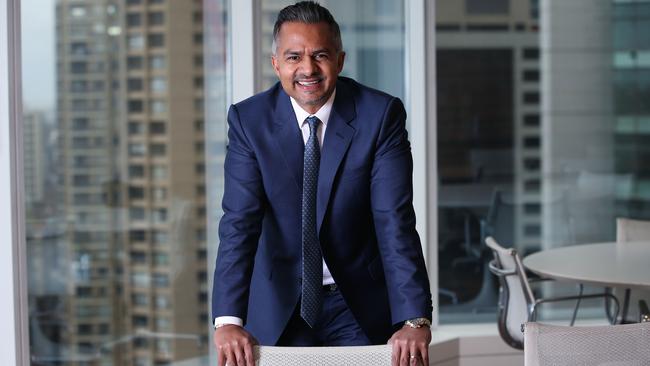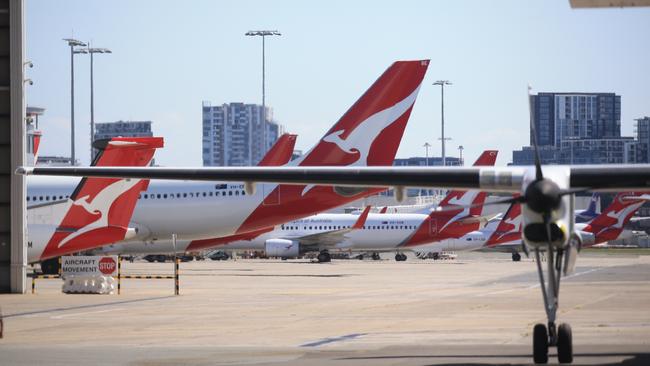M&A frenzy as cheap debt and Covid disruption opens doors

With a $23.6bn price tag, the IFM-led consortium finally has Sydney Airport in the bag, assuming the niggling issue of overlapping industry fund interests in the national airports market doesn’t bother the ACCC too much.
Bought at a time when no one can quite see fully open borders, all the planes back in the air and eye-wateringly expensive sauvignon blanc and carparking all returning to business as usual, this is a once-in-a-generation change of ownership. Clever old them.
The investment power of institutional funds both Australian and international began as a slow burn but it is now driving much of the action.
It could be a single buyer or at least consortium maestro, like the Canadians Brookfield in the recent $10bn takeover of AusNet. In other cases it is the linchpin role played on the register of a target company, like QSuper shareholding in Sydney Airport. We will see more of this strategy.
Superannuation money has its own investment imperative but there is plenty of traditional corporate action in a market of low rates, ESG pressure and pandemic disruption. These takeovers and mergers require all manner of debt and equity financing from capital markets.
The latest data from Refinitiv reveals an eye watering $US224.5bn ($305bn) of deals announced in Australia this year, 1599 transactions in total, up 367 per cent over last year and on track to eclipse the bumper run of post-GFC transactions in 2011.
Another takeover on super Monday was Wesfarmers’ very strategic and patient buy of Australian Pharmaceutical Industries — a classic old-style acquisition and hopefully one of the 30 per cent of M&A deals that truly adds value.

The strategy makes sense, both because of opportunity in health and wellbeing and the far-reaching distribution network of pharmacies where Wesfarmers can leverage its supply chains.
Then there is the energy sector, the fossil fuel side.
BHP has offloaded all but one of its coal mines with the $1.6bn sale of its 80 per cent stake in Bowen Basin coking coal assets to Stanmore Resources, a miner 73 per cent owned by an Indonesian company.
Most of the equity funding required for the deal will come from Indonesian interests.
It has been clear for some time that the BHP board no longer has any appetite for coal. Those who do see value in coal are increasingly closer to the end users in Asia. That is why Paul Flynn at Whitehaven Coal is going to Asia to raise $1bn in debt to fund growth.
Also on Monday, the board of Australian gas company Senex agreed to a $960m takeover offer from the Korean steelmaker Posco International.
The deals are part of a developing story on ESG pressure, where customers of Australia’s fossil fuel export industry will take over the funding of its longevity and growth.
–
Gupta’s promise
Stockland chief executive Tarun Gupta is reshaping the company with some new bets on what will and what will not deliver in property. He is also capitalising on the billions of dollars of institutional investment looking for a home. As a former chief financial officer of Lendlease his institutional contacts will be useful.
Covid-19, supply chain shocks and the shift to e-commerce have coincided to make logistics the new black for property. That is largely at the expense of the retail property sector.
Gupta is doubling down on the core residential business, and logistics and workplace assets which together employ about 50 per cent of Stockland’s capital allocation.
Those businesses, with a $33bn development pipeline, will rise to 70 per cent of employed capital over five years. At the same time he is shrinking the exposure to both the retail and the retirement sectors.
Six months into the job, Gupta deliberately hit the market with gusto, and some new five-year targets on the returns on capital invested: 6-9 per cent on recurring rental income and 14-18 per cent for development income.
The strategy, he says, is about pace and conviction.
He promises to be more dynamic than the company has been in the past.
Logistics commands some of the highest potential returns. It accounts for about $3bn of Stockland’s $33bn pipeline, which might seem low given the frenzy over space for new distribution centres in outer suburbs of the main cities.
In April ESR Australia’s $3.8bn purchase of 45 industrial and logistics properties from Blackstone broke records and last month Qantas sold 13 hectares of land around Sydney Airport to Asian fund manager Logos for $800m.
Gupta is comfortable with the $3bn target allocation. “We already have around 30 per cent of our business in logistics and $1.5bn of that is getting shovel ready over the next couple of years. Most of that we will own because we have some large programmatic projects in Kemps Creek and Melbourne Business Park.”
Stockland’s logistics capability — including a 60 strong team — taken with the uplift in land value is attracting interest from capital partners. “My background is in long-term funds management so we are going to be taking advantage of that to really scale up our platform,” says Gupta.
“Yes, logistics is a hot sector but develop-to-own and optimising our land bank is a point of difference,” he says.
“We are sitting on some good embedded margins and that is what we are looking to leverage. We are confident we can operate in the upper end of our target capital ranges in that sector.”
Tarun Gupta’s dynamic strategy pitch is to be welcomed. Like all developers, his challenge will be the speed at which he can achieve development. Local government issues can often be trickier than state planning.
How easy it will be to transition the business with such obvious hot and not-hot sectors is also an open question. “Before I started, we had 60 per cent of our net funds employed in retirement and retail. That’s an overweight potion, we are trying to bring that down to under 30 per cent.”
Gupta says he is getting good value offloading non-core retail assets, like the Cairns Central sale announced on Monday. Seventy-five per cent of the retail portfolio is leveraged to essential retail. For these assets, which are performing, Stockland may not sell out. Instead the plan is to joint venture. Indeed he expects the retail platform will grow. “We believe it’s an attractive proposition. Unlisted private capital haven’t had access to that sort of portfolio,” he says.
As to whether the retirement portfolio should be sold down or joint ventured, the CEO has an open mind.
Gupta’s confidence in the apartment market is worth noting and he has poached Ben Christie from his old shop Lendlease to run the operation.
At its peak of about 200,000 new homes built three years ago, Gupta says about half were apartments. “Clearly a lot of foreign buyers were driving that growth but over the long term we still produce 60,000 to 80,000 apartments a year. We are looking to diversify into that because we are the strongest residential brand in Australia.”
With apartment values a fraction of houses, Gupta believes this is the right time in the cycle to move in to apartments, leveraging the Stockland brand and the property bank. “We had broadacre subdivision, we’ve gone into town homes, 600 a year; we’ve gone into land lease communities and we are now branching out into apartments to really be the leading residential player in the market both for ownership and for selling residential product.”







Monday’s stampede of done and dusted M&A deals is a good pointer to what boardrooms in Australia believe about business opportunity and risk.